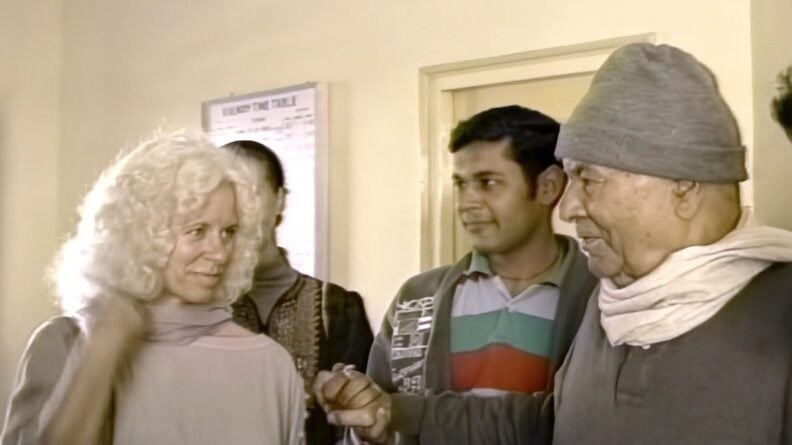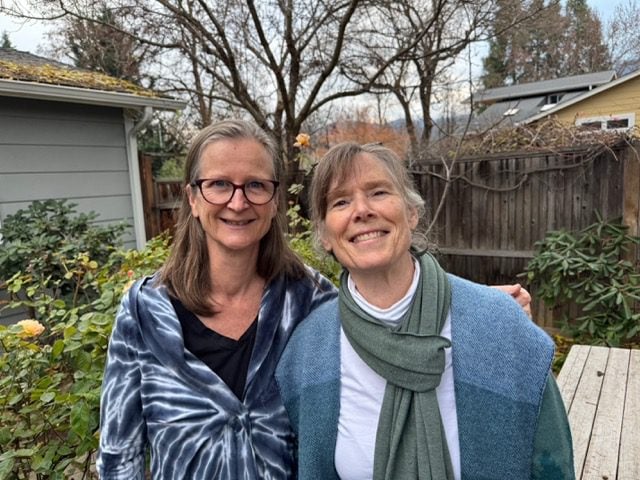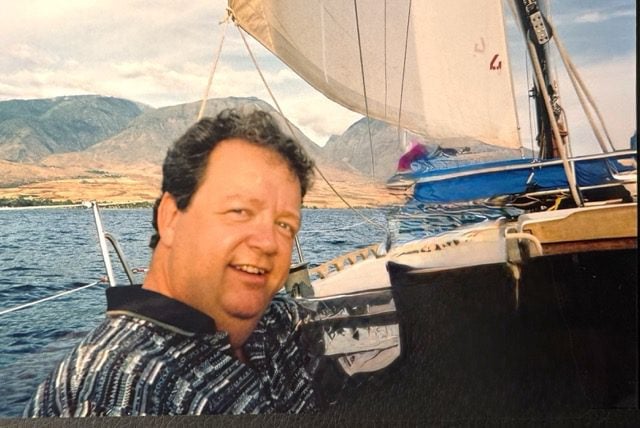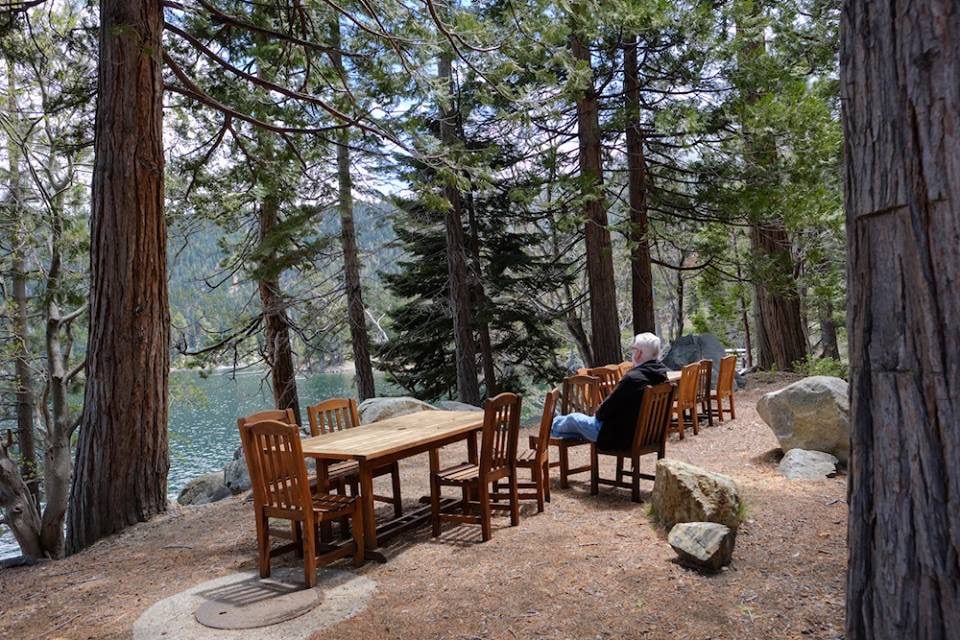You are my other me: "In Lak'Ech"
One of the messages that kept me listening to Gangaji was when she said "the heart heals entirely" and that the true self was "untouched" by the person's experience. For me, this was a primary draw to Gangaji's teachings. I was interested in healing, so the backdoor of "untouched" was something that caught my attention. The more I listened I saw that I was the Awareness experiencing the world from my point of view. This shift of perspective offered a kind of detachment, in that all of the world was inside of this awareness. I am multiracial and have taught Diversity, Equity, and Inclusion coursework since 1994. Gangaji's teaching offered a deepening that I want to talk about more here in relationship to social ailments like racism.
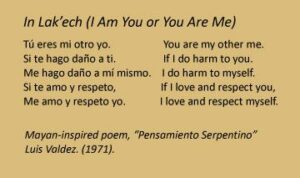 There is a Mayan saying "In Lak'Ech" that speaks to this deepening. It means "You are my other me." Like "Namaste," "In Lak'Ech" is founded in the recognition that you are awareness experiencing this world from your point of view and your experience. "We" are that same awareness. This changes everything. When I experience you as my "other me," it results for me in a willingness to understand another's experience, living from the same source.
There is a Mayan saying "In Lak'Ech" that speaks to this deepening. It means "You are my other me." Like "Namaste," "In Lak'Ech" is founded in the recognition that you are awareness experiencing this world from your point of view and your experience. "We" are that same awareness. This changes everything. When I experience you as my "other me," it results for me in a willingness to understand another's experience, living from the same source.
There is a danger in the image of the enlightened person (often male) alone on a mountain-top, or running a meditation center with a spa. These images suggest a removal from the world and its noise and complications. This image can misrepresent walking-in-the-world-awake because it does not demonstrate a life led by the recognition that your source and their source are the same, a life lived in a community of people and all life to whom "You are my other me." While there may be a place for those images for some, the images of separation from the world also under-evaluate the temporary world as unreal, ephemeral, and therefore less somehow than the eternal. But this temporary world is sacred. The temporary world is founded within and by awareness, and is therefore not essentially different than or separate from the eternal. To reject the temporary world is to argue with awareness.
How Spiritual Language Can Reinforce White Supremacy
So, how can spiritual language unwittingly reinforce white supremacy? When talking about racism in spiritual circles, quickly I hear comebacks like "only the Self matters," "there is no race," or "there is no racism." In practice, this sentiment is no different than the color-blind ideology of "I don't see color." To me, this looks like a retreat to spiritually accurate, universal language as a way to dismiss the relevance and inter-responsibility in racism. In practice, "there is no race" in this society becomes a way to ignore the current harm to people of color, and the loss for some Euro-Americans of trustworthy relationships with people of color. The notion "there is no race" is a way of sweeping the racism that is happening in front of our eyes—on the street, in the media, in policies and law, between communities, while standing on stolen Native American land—under the rug. While differences such as race do in fact fall and crumble as awareness is directly experienced, at the everyday level of speaking, you are left watching the profoundly institutionalized and interpersonal isms that are playing out in people's lives—in political and institutional policies, in courts, and lived-as-real circumstances that are causing extensive, unnecessary harm. I am talking about police brutality, segregated and inequitable schools, lack of opportunities, restricted access to resources, hijacked hiring processes, inequitable funding, etc. that in general inhibit access to the means of survival.
"While differences such as race do in fact fall and crumble as awareness is directly experienced, at the everyday level of speaking, you are left watching the profoundly institutionalized and interpersonal isms that are playing out in people's lives."
Here I speak to some of the ways I have witnessed people in this self-realization tradition dismiss the power of caste systems, in this case, white supremacy. By using "there is no race" they are bypassing the responsibility, the inclination, and the calling to act in community with and in defense of other people. To me, talking about isms is a way to put into practice recognizing yourself in another.
This sacred moment presents to us a very serious problem given the overt history of racialized oppression and white supremacy. When European Americans see people of color (or any other oppressed group) as my "other me," then what does that recognition in this living moment invite you to acknowledge, feel, experience, or do?
Institutionalized Racism & White Privilege as Conditioning
This week I am teaching a short presentation on Institutionalized Racism. It is packed with heinous, systemic, organized, and interpersonal forms of racialized violence, like American Indian removal, racialized exclusion, segregation, discrimination, and cruelty in every formal social institution, like housing, media, education, employment, criminal justice, healthcare, and marriage. This results in forms of profound and repetitive conditioning. Awakening for me has been like an onion—uncomfortable, making my eyes water—but ultimately good because the direct experience that "I am Awareness" frees forms of conditioned identification. For example, I have noticed ways I emotionally respond to people that I have learned to see as different and similar, safe and unsafe, with internalized judgments that result in my actions, such as avoidance or inclination.
 This is not to suggest here that the mostly European-American following of Gangaji immediately reach out to people of color. Instead, I caution those of you who are new to noting conditioned institutionalized racism to investigate implicit and unconscious biases in private, rather than with people of color. I say this because people of color who understand the history and have insidious experiences of racism and other traumas of their own, have their own work to do as they recognize and free identifications from the position as oppressed. While essentially, direct experience is the same, freeing unconscious conditioning from the oppressor position is, practically speaking, different than conditioning through oppression.
This is not to suggest here that the mostly European-American following of Gangaji immediately reach out to people of color. Instead, I caution those of you who are new to noting conditioned institutionalized racism to investigate implicit and unconscious biases in private, rather than with people of color. I say this because people of color who understand the history and have insidious experiences of racism and other traumas of their own, have their own work to do as they recognize and free identifications from the position as oppressed. While essentially, direct experience is the same, freeing unconscious conditioning from the oppressor position is, practically speaking, different than conditioning through oppression.
I wonder if the privilege to sweep racism under the rug is rooted in an unconscious identification with white-centered culture and the indirect conditioning of white privilege upon European American children. Such conditioning begins so early in their/our lives, and is so profound, that despite the awakening now, "you are my other me" across race can offer more deepening. Once someone begins an investigation that asks "what does white-centered culture looks like?" and "how is it expressed and reinforced?" they begin on a demanding task. To quote a former teacher of mine who does not prefer to be named "Love is demanding!"
"When European Americans see people of color (or any other oppressed group) as my "other me," then what does that recognition in this living moment invite you to acknowledge, feel, experience, or do?"
I have had the challenging task of teaching diversity coursework to a diverse class of graduate students for decades. I strive to create a learning environment while having to give sensitive public feedback. When talking about inter-racial relationships between exclusively African-American and Euro-American communities, I had a student contrast those communities as "American" and "African-American." I asked her, "When you say 'American' do you mean all residents of the USA or European-Americans?" She hesitantly said "Oh! I mean Euro-Americans." This gave me a moment to say, "You know, often Euro-Americans are represented as "Americans" in media, and Native-Americans, Asian-Americans, and African-Americans know they are rarely represented in pictures of "Americans," or are pictured on the periphery while European-Americans are in the center of the image. Some European-Americans overlook that people of color are absent or marginalized in these pictures. To my student, I said, "That you learned this was not your fault, but it is your responsibility not to pass the legacy of racism down." White culture has been centered and privileged in the popular media/culture, especially for those people over 40 years old. White is the standard from which all other races are typically judged and referenced. For Euro-Americans it often takes investigation because they must look for what is absent.
The Lure of Identifying with Safety Can Be Like Wallpaper
 When it comes to the subtleties of white-centeredness and/or white supremacy, oppressor conditioning is dangerous and unfortunately easy, because of the "lure of safety."[1] Oppressor conditioning is an insidious education in separation. Its promise is to provide safer ground, access to better schools, protection from “others” through gated communities, cohorts, and employment networks filled with the familiarities of European Americans. Oppressor conditioning thus perpetuates separation, sustains dominance, and furthers elitism. Oppressor conditioning can clog perceptual filters. To acquiesce to a privileged identity requires blind spots that, like morphine [2], numb the harm happening to "others" due to reservations, exclusion, segregation, and lack of safety, despite its physical distance. I found I had been derailed by my own conditioned judgments because some of the conditioning I grew up with was so pervasive. For example, despite being Tunisian, among other ancestries, I realized I had witnessed media disproportionately represent African-Americans, and specifically African-American men, as violent. My limbic system unknowingly conditioned that connection that was not in my lived history, and it took conscious awareness to unwind it. I have also been treated as if talking about racism suggests "I don't get it, yet," as if to awaken ends racism.
When it comes to the subtleties of white-centeredness and/or white supremacy, oppressor conditioning is dangerous and unfortunately easy, because of the "lure of safety."[1] Oppressor conditioning is an insidious education in separation. Its promise is to provide safer ground, access to better schools, protection from “others” through gated communities, cohorts, and employment networks filled with the familiarities of European Americans. Oppressor conditioning thus perpetuates separation, sustains dominance, and furthers elitism. Oppressor conditioning can clog perceptual filters. To acquiesce to a privileged identity requires blind spots that, like morphine [2], numb the harm happening to "others" due to reservations, exclusion, segregation, and lack of safety, despite its physical distance. I found I had been derailed by my own conditioned judgments because some of the conditioning I grew up with was so pervasive. For example, despite being Tunisian, among other ancestries, I realized I had witnessed media disproportionately represent African-Americans, and specifically African-American men, as violent. My limbic system unknowingly conditioned that connection that was not in my lived history, and it took conscious awareness to unwind it. I have also been treated as if talking about racism suggests "I don't get it, yet," as if to awaken ends racism.
As identification shifts, the "person" unravels. The "person" is created by social/emotional/cognitive conditioning, conditioning of our limbic systems in response to the presence of danger, perceived or real. Racism and all other isms are based in fear and are often unseen like wallpaper; they are unidentifiable. So, I am naming some here, so that when we meet across race, there is the ability to truly meet "In Lak'Ech," the heart of a person of color.
About Michelle
Dr. Michelle Maher is an international speaker on Diversity, Equity, and Inclusion (DEI) and has taught DEI coursework for professional organizations and on the graduate and undergraduate level since 1994. Michelle met Gangaji in the Summer of 2004. Dr. Maher's work focuses on the forms of institutionalized discrimination and the awareness, skills, resilience, and transformation needed for social justice and parity to be achieved. She is a former Visiting Assistant Professor at Lewis & Clark College and a Syracuse University Fellow. You can write her at drmichellemaher@gmail.com
[1] A "shout out" to Barb Denempont, Executive Director for the Gangaji Foundation, who pointed this out.
[2] Shout out to Rich Torres, faculty at Chemeketa Community College and Zen Chaplin, for his recognition, insight, love and the "morphine" comparison. There are so many "morphines" that look like Truth.

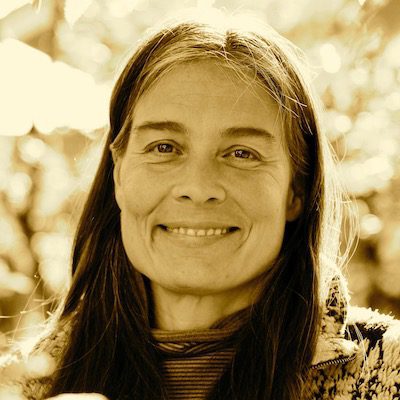
 There is a Mayan saying "In Lak'Ech" that speaks to this deepening. It means "You are my other me." Like "Namaste," "In Lak'Ech" is founded in the recognition that you are awareness experiencing this world from your point of view and your experience. "We" are that same awareness. This changes everything. When I experience you as my "other me," it results for me in a willingness to understand another's experience, living from the same source.
There is a Mayan saying "In Lak'Ech" that speaks to this deepening. It means "You are my other me." Like "Namaste," "In Lak'Ech" is founded in the recognition that you are awareness experiencing this world from your point of view and your experience. "We" are that same awareness. This changes everything. When I experience you as my "other me," it results for me in a willingness to understand another's experience, living from the same source. This is not to suggest here that the mostly European-American following of Gangaji immediately reach out to people of color. Instead, I caution those of you who are new to noting conditioned institutionalized racism to investigate implicit and unconscious biases in private, rather than with people of color. I say this because people of color who understand the history and have insidious experiences of racism and other traumas of their own, have their own work to do as they recognize and free identifications from the position as oppressed. While essentially, direct experience is the same, freeing unconscious conditioning from the oppressor position is, practically speaking, different than conditioning through oppression.
This is not to suggest here that the mostly European-American following of Gangaji immediately reach out to people of color. Instead, I caution those of you who are new to noting conditioned institutionalized racism to investigate implicit and unconscious biases in private, rather than with people of color. I say this because people of color who understand the history and have insidious experiences of racism and other traumas of their own, have their own work to do as they recognize and free identifications from the position as oppressed. While essentially, direct experience is the same, freeing unconscious conditioning from the oppressor position is, practically speaking, different than conditioning through oppression. When it comes to the subtleties of white-centeredness and/or white supremacy, oppressor conditioning is dangerous and unfortunately easy, because of the "lure of safety."
When it comes to the subtleties of white-centeredness and/or white supremacy, oppressor conditioning is dangerous and unfortunately easy, because of the "lure of safety."